新编实用英语2Unit 8
新编实用英语第二册文本教案8
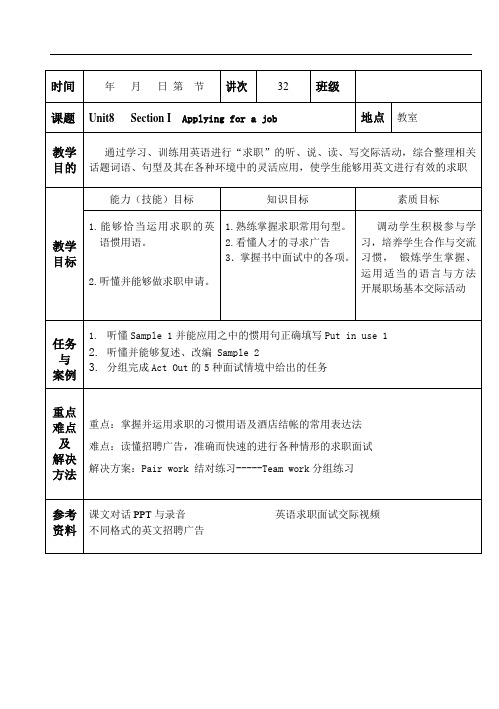
3.分组完成Act Out的5种面试情境中给出的任务
重点
难点
及
解决
方法
重点:掌握并运用求职的习惯用语及酒店结帐的常用表达法
难点:读懂招聘广告,准确而快速的进行各种情形的求职面试
解决方案:Pair work 结对练习-----Team work分组练习
参考
资料
任务类型:英文求职面试的听说读写译综合运用
具体要求:掌握并灵活运用英语求职面试的常用句型,能够得体应对各种面试情况及求职等各种情况。准确理解招聘广告。语调和语气自然。
子任务1:学习、运用英语求职及面试的基本句型
行为反馈:
注意倾听老师与班长对话并可能争相插话,产生兴趣和学习动机
10分
呈现任务1:
课文第一段进行面试对话的听、说、读、写
1.播放Sample 1
2.协助理解归纳
3.板书关键词句
面试基本句型:
1. I graduated from……
2. What job are you applying for……
1.能够恰当运用求职的英语惯用语。
2.听懂并能够做求职申请。
1.熟练掌握求职常用句型。
2.看懂人才的寻求广告
3.掌握书中面试中的各项。
调动学生积极参与学习,培养学生合作与交流习惯,锻炼学生掌握、运用适当的语言与方法开展职场基本交际活动
任务
与
案例
1.听懂Sample 1并能应用之中的惯用句正确填写Put in use 1
3.结对练习此对话
对话
录音或PPT
15分
深化任务2:
面试的其他表达方法
1.组织列举相关情境的其他说法
新编实用英语(第二版)unit8.ppt

Text-related Information
Generally speaking, you will find few health hazards when traveling in England. The water is safe to drink unless a sign says otherwise (for example on trains), milk is pasteurized and you should find few problems with food if it is cooked properly. However, a change in climate, diet, and water supply in itself can cause problems such as an upset stomach, so take care, especially with your diet.
New Practical English 1
Text
Para.3 At all times, personal
cleanness is of the biggest importance. 3 You
should always wash your hands after using
the toilet and before preparing or eating food. About 20-50 per cent of tourists suffer from diarrhea caused by infections of various kinds of bacteria or viruses. Para.4 If you are with some
实用大学英语综合教程2Unit 8 Happiness and Satisfaction_OK
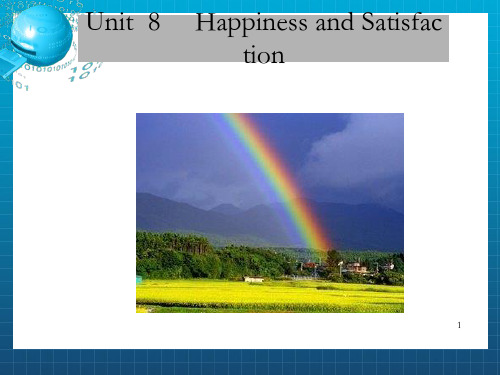
1
1 Listening
2 Reading
3 Grammar Tips
4 Translation 5 Practical Writing 6 Reading for Fun
75 Practicing Yourself
4
2
Part 1 Listening
18
• Para 8 • recommend • vt.推荐; 劝告 • Can you recommend a good hotel?
• 你能推荐一家好的饭店吗? • We strongly recommend reporting the incident to the police. • 我们强烈建议报警。
9
• convince • vt. 使相信,使明白 • I try to convince him of the reality of the danger.
10
• Para 2 • vision
• n. 视力,视觉; 想象(力),幻想,幻觉, 梦想
• I've had my eyes tested and the report says that my vision is perfect.
Tasks
Ⅰ. 1. happy 4. appreciate 7. irrelevant
2. content 5. sober-minded 8. create
3. dissatisfied 6. cultivate 9. joyously
Ⅱ. 1---5 ABBDB 6---10 ADCDC
27
Suggested Answers to Tasks in Text A
《新编实用英语二》Unit8 Reading
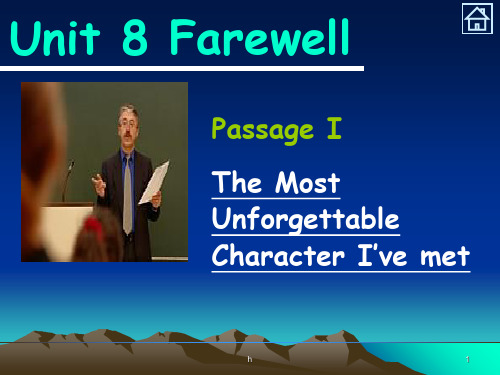
h
11
Difficult Sentences
1. (Para.1) Before long, through the door came in a tall, unimpressive-looking man of about 40.
完全倒装结构
Translation
很快,从门口走进一个高高的、40来岁的男子, 看上去其貌不扬。
used as a prep. or a conj., meaning “up to (the time that) ”
Translation
他有办法使我们对一个故事、一位文学人物或一 种思想的某一部分产生悬念,让我们充满好奇,
渴望了解更多的知识。
Example
A newspaper editor dangled his cheque book before thirsty writers.
Unit 8 Farewell
Passage I The Most Unforgettable Character I’ve met
h
1
Passage I
The Most Unforgettable Character I’ve met
Intensive Study Practice
h
2
Intensive Study
Inside the parcel was a letter addressed to my
Example father. (完全倒装)
Seldom had I seen Sasha so upset. (部分倒装)
h
12
Difficult Sentences
2. (Para. 2) His voice had a surprising tone of respect, almost as if he were addressing the Supreme Court instead of a group of youngsters.
新编实用英语综合教程 2 Unit 8 (passage 3) 教案

新编实用英语综合教程 2 Unit 8 (passage 3) 教案The Most Unforgettable Character I ' ve Met•Students' requirements:A: Have a general ideal of what is a narration and how to describe a person or a scene. B: Give a summary of the text in your own words before class.C: Master some important grammar rules in this text.II. Key pointsA: Introduction of the narrationB: Analysis of text structureIII. Reading comprehension (15 min.)Introduction of the narration and analysis of text structureIV. Language Points (30 min.)A: 倒装结构以及常见的几种倒装类型。
B : as if 引导的状语从句和 wish 后宾语从句的虚拟结构。
C :现在分词作状语的几种结构和意义。
D :“ see sb doing sth”和“ see sb do sth”的区别以及类似的表达。
IV. Use of Teaching Facilitiesmulti-media teaching facilitiesV. Assignment:Imitate the text to write a 200-word composition in the form of narration , you can narrate any person : your parents , friends , classmates , and so on 。
最新新编实用英语综合教程2 -Unit 8 Appliying for a job教案资料
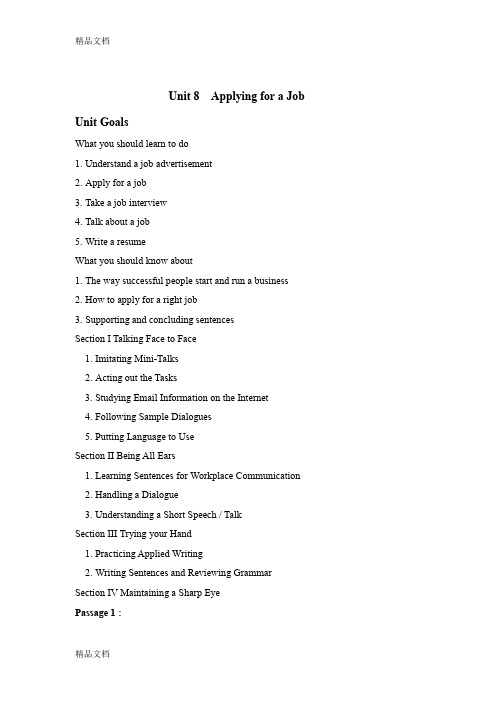
Unit 8 Applying for a Job Unit GoalsWhat you should learn to do1.Understand a job advertisement2.Apply for a job3.Take a job interview4.Talk about a job5.Write a resumeWhat you should know about1.The way successful people start and run a business2.How to apply for a right job3.Supporting and concluding sentencesSection I Talking Face to Face1.Imitating Mini-Talks2.Acting out the Tasks3.Studying Email Information on the Internet4.Following Sample Dialogues5.Putting Language to UseSection II Being All Ears1.Learning Sentences for Workplace Communication2.Handling a Dialogue3.Understanding a Short Speech / TalkSection III Trying your Hand1.Practicing Applied Writing2.Writing Sentences and Reviewing Grammar Section IV Maintaining a Sharp EyePassage 1 :Text Applying for a New BossWhen I went off to college, I got one piece of advice from my father: “It doesn’t matter what courses you take, just find the great professors.”Sure enough, I soon discovered that all kinds of subjects were interesting to me as long as good teachers presented them. In Professor Weinstein’s class, I could hear the tumbrels rolling through the streets of Paris during the French Revolution. And going back further, I can still recall things about the stars that I should have long ago forgotten if not for mysecond-grade teacher, Miss Scorchiotti. To me, a great teacher is one who performs a subject in a way that makes it come alive.A great boss does the same. They turn the day-to-day uninteresting jobs into a learning experience. They convince you that you and what you are doing actually matter. They give you confidence, which makes you more willing to ask a question, or assume responsibility, or even suggest a change in some age-old company process. In short, a great boss knows how to teach.So my advice to anyone bound for the job market in the coming years and to anyone looking for a different work experience is: Don’t interview for the right job. Interview for the right boss. Not a best person, but someone who is willing and able to help you grow professionally.What are some signs of the wrong boss? Well, anyone who:●is surrounded by the same team year after year. If you’re such a good teacher, why aren’t these people moving on and getting promoted?●is short of a sense of humor. Life is short. Work is hard. Let’s lighten up when facing something difficult.●loves typing. Hates talking. Why are you emailing me when I sit across the hall?Who are the best bosses I ever had? Angela, my first boss out of college, was very clever and outspoken. She ruffled feathers around the company but was eager to letme in on what she thought and why.My boss Tom used to say: “You can sleep when you’re dead.”Working for Tom was just a bit exhausting. But he was also unbelievably straightforward, and quick to ask advice and give it. We often had different opinions, yet our discussions helped both of us learn more about what we were trying to perform. A great boss both gives respect and earns it.And how do you know when you’ve found the right boss? Be yourself with them and see if the self they are with you is someone you want to learn from for a couple of years. If that person is dull or dogmatic in an interview, guess what they’re going to be like Monday through Friday? Interviewees are on their best behavior in that setting, but so are interviewers. You don’t like what you see? The power is yours. Go out and interview another boss.Language Points1 Explanation of Difficult Sentences1. (Para. 1) And going back further, I can still recall things about the stars that I should have long ago forgotten if not for my second-grade teacher, Miss Scorchiotti ... Analysis: This is a complex sentence. That introduces a relative clause to modify the stars, followed by an if-clause of condition. Attention should be paid to the subjunctive mood used here: should have forgotten, ... with the latter part being an elliptical clause which can be assumed to be if it were not for ...Translation: 再早些,我仍然记得有关星体的知识,若不是由于我二年级的斯高奇奥迪老师,我早就将其忘光了。
新编实用英语综合教程2第四版汉译英答案

新编实用英语综合教程2第四版汉译英答案(总12页)-CAL-FENGHAI.-(YICAI)-Company One1-CAL-本页仅作为文档封面,使用请直接删除新编实用英语综合教程2第四版汉译英答案Unit 1P141) 你能告诉我在哪儿可以买到口香糖吗Can you tell me where I can buy some chewing gum2) 警察想知道她长什么样儿。
The police wanted to know what she looked like.3) 你知道她穿的是什么衣服吗Do you know what she was wearing4) 在报告中他们问到银行里有几个监控摄像头。
In the report, they asked how many security cameras there were in the bank.5) 面试官问他已经工作几年了。
The interviewer asked him how many years he had worked.6) 你想知道他什么时候去上海吗Do you want to know when he will leave for Shanghai7) 我只是想知道你喜欢什么颜色, 红色还是黄色。
I want to know which color you prefer — red or yellow.填空题1) What’s your guideline in choosing songs for your audience2) The seminar starts on Friday and the experts will be discussing the impact of tech nology on the climate in the future.3) Barclays appointed Bob Diamond, the head of its investment-banking business, as its new chief executive from March 2011.4) Frankly speaking, I cannot uphold such conduct. You see, it is aimed only at the pe rsonal interest.5) However, just because you can write statements in purely mathematical notations , this doesn’t mean that you necessarily should.6) That was good timing because his work was influential in shaping the project plan.7) Those studying abroad will most likely return home for better employment becau se of the tight job market abroad.8) It gives me great pleasure to express once again my deep appreciation for the gra nd reception and generous hospitality we enjoy here.P19Unit 2P381)你需要的是更多的锻炼。
新编实用英语2Unit8

Passage Listening
“Where does this road go?”
“I haven’t ever seen it go anywhere. It always stays right
where it is,” said the farmer, his work.
“How far is it to the next town?” said the stranger,
The farmer stopped the plow and turned and looked
for a long time at the city man. Then he said
,
“Maybe I don’t know much. Perhaps I am a fool.
But
I’m not lost!”
A. Seventeen. B. Seven.
C. Six.
D. It is not mentioned.
第六页,共32页。
Dialogue 1
4. Where is Fuyoujie?
A. It is far from Xidan.
B. Lily doesn’t know.
C. On the way to Qianmen.
(4) Why was the city man getting angry? __________________________________________
(5) What did the farmer say after the city man was getting angry?
__________________________________________
新编实用英语综合教程二 课后翻译 unit5-8
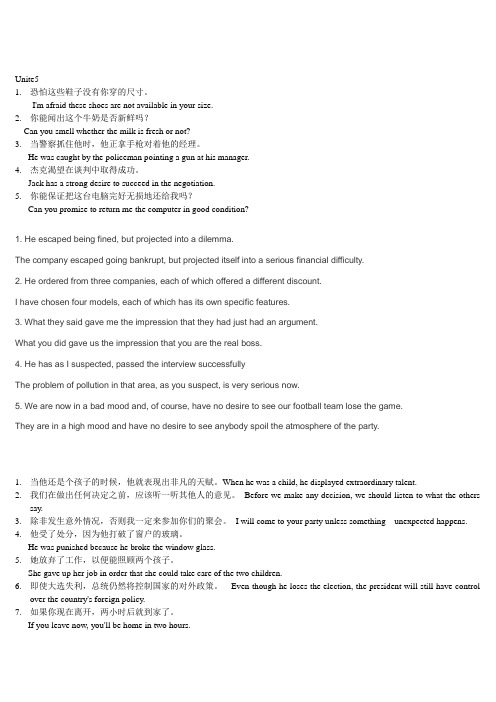
Unite51.恐怕这些鞋子没有你穿的尺寸。
I'm afraid these shoes are not available in your size.2.你能闻出这个牛奶是否新鲜吗?Can you smell whether the milk is fresh or not?3.当警察抓住他时,他正拿手枪对着他的经理。
He was caught by the policeman pointing a gun at his manager.4.杰克渴望在谈判中取得成功。
Jack has a strong desire to succeed in the negotiation.5.你能保证把这台电脑完好无损地还给我吗?Can you promise to return me the computer in good condition?1. He escaped being fined, but projected into a dilemma.The company escaped going bankrupt, but projected itself into a serious financial difficulty.2. He ordered from three companies, each of which offered a different discount.I have chosen four models, each of which has its own specific features.3. What they said gave me the impression that they had just had an argument.What you did gave us the impression that you are the real boss.4. He has as I suspected, passed the interview successfullyThe problem of pollution in that area, as you suspect, is very serious now.5. We are now in a bad mood and, of course, have no desire to see our football team lose the game.They are in a high mood and have no desire to see anybody spoil the atmosphere of the party.1.当他还是个孩子的时候,他就表现出非凡的天赋。
《新编实用英语二》Unit8 Writing
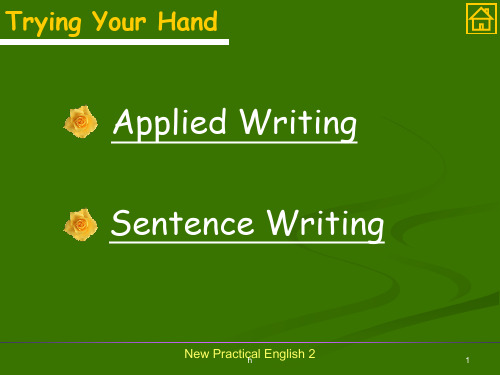
Regards, Don
New Practichal English 2
9
Useful sentences about farewell letter
(1) Our visit to China is drawing to a close and we are leaving for Canada tomorrow.
New Practichal English 2
17
Ellipsis (省略)
陈述句中的省略。 (1) 日常生活中用到省略句。 (2) Have a pleasant journey .祝旅途愉快
(省主语) (3) What a nice day! 多好的天气。(省主谓) (2) 回答问题时,可省略一些成分。 Will you join us?—well, I’d love to. What’s your family name? –Johnson.
(2) On the eve of our departure, it gives me a great deal of pleasure to write you to express our appreciation.
(3) Much to my regret I was unable to see you off at the airport.
2
The conception of farewell letter
A letter of farewell is often written to express your thanks to somebody for the hospitality and kindness you have received from him or her.
新编实用英语综合教程二Unit-Applying-for-a-Jobppt课件
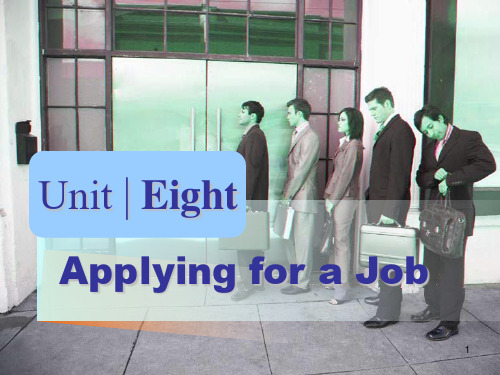
Speak and Recite
1 Work in pairs. Look at the picture and recite the following mini-talks for a job interview.
1) Can you tell me about your education? Interviewer: Can you tell me about your education?
2 Unit | Eight
Talking Face to Face
Section Ⅰ
Section Ⅱ
Being All Ears
Section Ⅲ
Contents
Section Ⅴ
Appreciating Culture Tips
Section Ⅳ
Maintaining a Sharp Eye
independent financially. Interviewer: If we need you to travel frequently on business, would that be ok with you? Ma Li-heng: Yes, no problem. 5) What’s your view on the job? Interviewer: First of all, I’d like you to write something in English. Sun Qiang: About what? Interviewer: We’d like you to give your view on the use of computers in our business. Sun Qiang: To be frank, I don’t know much about your business, but I know a lot
《新编实用英语》教案第二册Unit 8
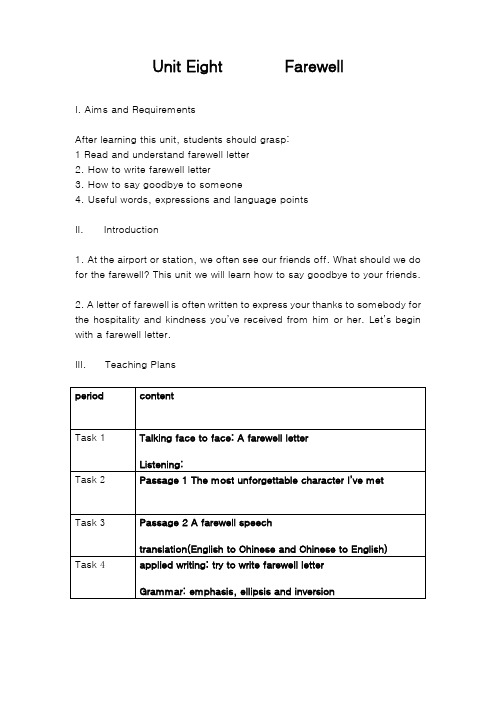
Unit Eight FarewellI. Aims and RequirementsAfter learning this unit, students should grasp:1 Read and understand farewell letter2. How to write farewell letter3. How to say goodbye to someone4. Useful words, expressions and language pointsII. Introduction1. At the airport or station, we often see our friends off. What should we do for the farewell? This unit we will learn how to say goodbye to your friends.2. A letter of farewell is often written to express your thanks to somebody for the hospitality and kindness you’ve received from him or her. Let’s begin with a farewell letter.III.Teaching PlansTask 1 Talking face to face: A farewell letterL istening comprehensionPart 1 Read and translate some farewell lettersPart 2Read some dialogues about farewell and try to learn how to say goodbye to your friendsPart 3 Useful expressions and sentence patterns about farewellPart 4 PracticesPart 1 Read and translate some farewell lettersA letter of farewell is often written to express your thanks to somebody for the hospitality and kindness you’ve received from him or her.The farewell letter in page 131 is for you to translate, after translation you may be know more about this kind of letter, and this kind of knowledge will help a lot whenever you write one.Part 2 Read some dialogues about farewell and try to learn how to say goodbye to your friendsSample 1 How to say goodbye for different places?1. To learn the sentences to express your greetings, thanks, saying goodbyes, talking about future of business and so on.2. Tasks after class, try to make dialogues according to the giving message on page 133.Part 3 Useful expressions and sentence patterns about farewell1. Patterns for hostWe hope you’ll visit China again.Have you got everything ready for the trip?Did you enjoy your stay here?Can you stay a little longer?I wish you a pleasant journey.I’m sorry to see you go. I hope you’ll come back again.I wish you a very pleasant journey home. 祝您回国一路顺风。
《新编实用英语二》Unit8 Talking

h
11
Task Five
A: How time flies! You’ve been in China for over a year.
B: It’s time for me to go back home, you know. Before I leave, I’d like to thank you for all you’ve done for me.
L = Mr. Lowenberg
Z = Zhang
L: Thanks a lot for seeing me off at the station.
Z: You are welcome. Did you enjoy your stay here?
L: Well, I must say my stay in China has been very enjoyable and productive.
Y: Bye.
h
6
Act Out
Task One Task Two Task Three Task Four Task Five
h
7
Task One
A: Good evening, Mr. Smith. I’m going back home tomorrow.
B: Oh, I’m sorry to see you go. I hope you’ll come back again.
Z: I’m pleased to hear that.
h
3
Sample 1
L: I’m sure we’ll cooperate well and do more business to our mutual benefit in future. Z: The feeling is mutual. L: Thanks again for everything. Oh, I must be running now. Goodbye. Z: Goodbye, Mr. Lowenberg. Hope to see you again.
《新编实用英语二》Unit8 Talking

now. Goodbye. Z: Goodbye, Mr. Lowenberg. Hope to see you again.
Sample 2
Saying Goodbye to Mr. Smith at the Hotel
Y = Mr. Yang
S = Mr. Smith
Y: S: Y:
Good evening, Mr. Smith. Good evening, Mr. Yang. Are you leaving tomorrow morning? Can’t you stay a little longer?
Z:
I’m pleased to hear that.
Sample 1
L: I’m sure we’ll cooperate well and do more business
to our mutual benefit in future. Z: L: The feeling is mutual. Thanks again for everything. Oh, I must be running
Task Two
A: B: Have you got everything ready for the trip? Yes. Thank you for your kindness.
A:
B:
I’d like to see you off at the airport.
It’s very nice of you. But I think I can manage everything myself. Thank you all the same.
Task: You are seeing off a foreign friend of yours at the airport.
新编实用英语综合教程2 -Unit 8 Appliying for a job教案
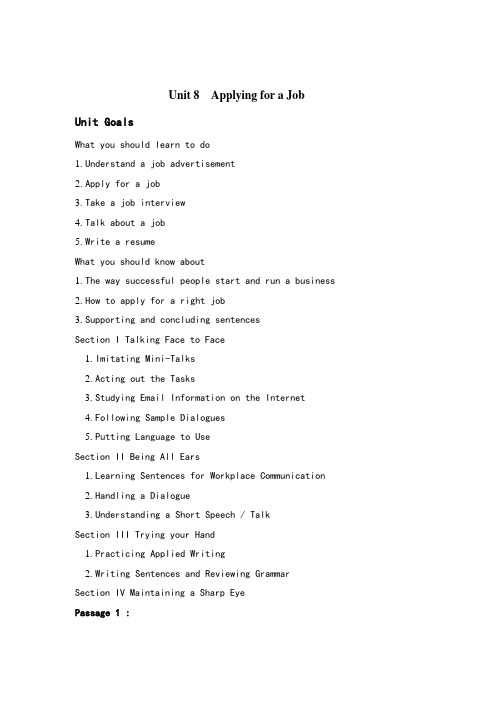
Unit 8 Applying for a JobUnit GoalsWhat you should learn to do1.Understand a job advertisement2.Apply for a job3.Take a job interview4.Talk about a job5.Write a resumeWhat you should know about1.The way successful people start and run a business2.How to apply for a right job3.Supporting and concluding sentencesSection I Talking Face to Face1.Imitating Mini-Talks2.Acting out the Tasks3.Studying Email Information on the Internet4.Following Sample Dialogues5.Putting Language to UseSection II Being All Ears1.Learning Sentences for Workplace Communication2.Handling a Dialogue3.Understanding a Short Speech / TalkSection III Trying your Hand1.Practicing Applied Writing2.Writing Sentences and Reviewing GrammarSection IV Maintaining a Sharp EyePassage 1 :Text Applying for a New BossWhen I went off to college, I got one piece of advice from my father: “It doesn’t matter what courses you take, just find the great professors.” Sure enough, I soon discovered that all kinds of subjects were interesting to me as long as good teachers presented them. In Professor Weinstein’s class, I could hear the tumbrels rolling through the streets of Paris during the French Revolution. And going back further, I can still recall things about the stars that I should have long ago forgotten if not for mysecond-grade teacher, Miss Scorchiotti. To me, a great teacher is one who performs a subject in a way that makes it come alive.A great boss does the same. They turn the day-to-day uninteresting jobs into a learning experience. They convince you that you and what you are doing actually matter. They give you confidence, which makes you more willing to ask a question, or assume responsibility, or even suggest a change in some age-old company process. In short, a great boss knows how to teach.So my advice to anyone bound for the job market in the coming years and to anyone looking for a different work experience is: Don’t interview for the right job. Interview for the right boss. Not a best person, but someone who is willing and able to help you grow professionally.What are some signs of the wrong boss? Well, anyone who:● is surrounded by the same team year after year. If you’re such a good teacher, why aren’t these people moving on and getting promoted?● is short of a sense of humor. Life is short. Work is hard. Let’s lighten up when facing something difficult.● loves typing. Hates talking. Why are you emailing me when I sit across the hall?Who are the best bosses I ever had? Angela, my first boss out of college, was very clever and outspoken. She ruffled feathers around the company but was eager to let me in on what she thought and why.My boss Tom used to say: “You can sleep when you’re dead.” Working for Tom was just a bit exhausting. But he was also unbelievably straightforward, and quick to ask advice and give it. We often had different opinions, yet our discussions helped both of us learn more about what we were trying to perform. A great boss both gives respect and earns it.And how do you know when you’ve found the right boss? Be yourself with them and see if the self they are with you is someone you want to learn from for a couple of years. If that person is dull or dogmatic in an interview, guess what they’re going to be like Monday through Friday? Interviewees are on their best behavior in that setting, but so are interviewers. You don’t like what you see? The power is yours. Go out and interview another boss.Language Points1 Explanation of Difficult Sentences1. (Para. 1) And going back further, I can still recall things about the stars that I should have long ago forgotten if not for my second-grade teacher, Miss Scorchiotti ...Analysis: This is a complex sentence. That introduces a relative clause to modify the stars, followed by an if-clause of condition. Attention should be paid to the subjunctive mood used here: should have forgotten, ... with the latter part being an elliptical clause which can be assumed to be if it were not for ...Translation: 再早些,我仍然记得有关星体的知识,若不是由于我二年级的斯高奇奥迪老师,我早就将其忘光了。
新编实用英语综合教程2Unit8教案

3. present (para.1 L3)
(v.) give away; introduce; show; put forward for consideresented her with a signed copy of his
新编实用英语综合教 程2Unit8教案
Section I Talking Face to Face
Advertisement 1
Job: full-time sales in clothing department Requirement / Qualification:
1) no sales experience 2) neat in appearance 3) strong people skills Benefit: a great start for a new job in sales
product lines Requirement / Qualification: 1) Graduate of a Mechanical Engineering degree or
diploma course, or a Drafting course with emphasis on Mechanical Drafting.
2) Experience with agricultural equipment
Dialogue 1 Having a Job Interview
apply: (v.) 申请 apply to sb./sth. for sth.
position: (n.)职位 course: (n.)课程 major in: 专业 salesman: (n.)推销员,售货员
Words & Expressions
新编实用英语综合教程2--Unit-8-Appliying-for-a-job教案
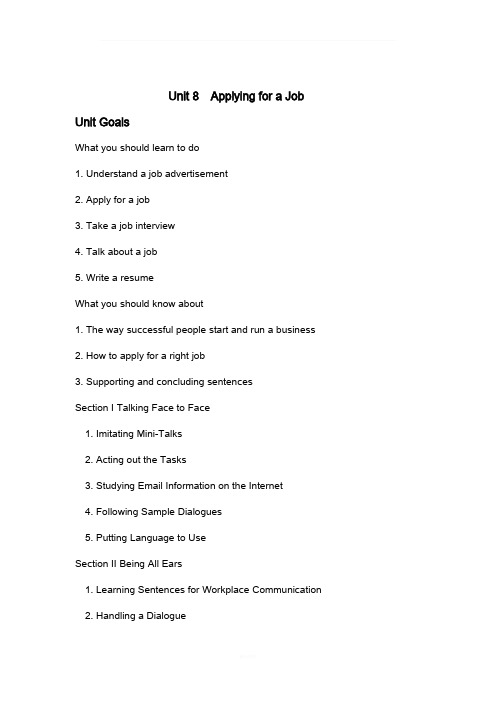
Unit 8 Applying for a Job Unit GoalsWhat you should learn to do1.Understand a job advertisement2.Apply for a job3.Take a job interview4.Talk about a job5.Write a resumeWhat you should know about1.The way successful people start and run a business2.How to apply for a right job3.Supporting and concluding sentencesSection I Talking Face to Face1.Imitating Mini-Talks2.Acting out the Tasks3.Studying Email Information on the Internet4.Following Sample Dialogues5.Putting Language to UseSection II Being All Ears1.Learning Sentences for Workplace Communication2.Handling a Dialogue3.Understanding a Short Speech / TalkSection III Trying your Hand1.Practicing Applied Writing2.Writing Sentences and Reviewing GrammarSection IV Maintaining a Sharp EyePassage 1 :Text Applying for a New BossWhen I went off to college, I got one piece of advice from my father: “It doesn’t matter what courses you take, just find the great professors.”Sure enough, I soon discovered that all kinds of subjects were interesting to me as long as good teachers presented them. In Professor Weinstein’s class, I could hear the tumbrels rolling through the streets of Paris during the French Revolution. And going back further, I can still recall things about the stars that I should have long ago forgotten if not for mysecond-grade teacher, Miss Scorchiotti. To me, a great teacher is one who performs a subject in a way that makes it come alive.A great boss does the same. They turn the day-to-day uninteresting jobs into a learning experience. They convince you that you and what you are doing actually matter. They give you confidence, which makes you more willing to ask a question, or assume responsibility, or even suggest a change in some age-old company process. In short, a great boss knows how to teach.So my advice to anyone bound for the job market in the coming years and to anyone looking for a different work experience is: Don’t interview for the right job. Interview for the right boss. Not a best person, but someone who is willing and able to help you grow professionally.What are some signs of the wrong boss? Well, anyone who:●is surrounded by the same team year after year. If you’re such a good teacher, why aren’t these people moving on and getting promoted?●is short of a sense of humor. Life is short. Work is hard. Let’s lighten up when facing something difficult.●loves typing. Hates talking. Why are you emailing me when I sit across the hall?Who are the best bosses I ever had? Angela, my first boss out of college, was very clever and outspoken. She ruffled feathers around the company but was eager to let me in on what she thought and why.My boss Tom used to say: “You can sleep when you’re dead.”Working for Tom was just a bit exhausting. But he was also unbelievably straightforward, and quick to ask advice and give it. We often had different opinions, yet our discussions helped both of us learn more about what we were trying to perform.A great boss both gives respect and earns it.And how do you know when you’ve found the right boss? Be yourself with them and see if the self they are with you is someone you want to learn fromfor a couple of years. If that person is dull or dogmatic in an interview, guess what they’re going to be like Monday through Friday? Interviewees are on their best behavior in that setting, but so are interviewers. You don’t like what you see? The power is yours. Go out and interview another boss.Language Points1 Explanation of Difficult Sentences1. (Para. 1) And going back further, I can still recall things about the stars that I should have long ago forgotten if not for my second-grade teacher, Miss Scorchiotti ...Analysis: This is a complex sentence. That introduces a relative clause to modify the stars, followed by an if-clause of condition. Attention should be paid to the subjunctive mood used here: should have forgotten, ... with the latter part being an elliptical clause which can be assumed to be if it were not for ... Translation: 再早些,我仍然记得有关星体的知识,若不是由于我二年级的斯高奇奥迪老师,我早就将其忘光了。
- 1、下载文档前请自行甄别文档内容的完整性,平台不提供额外的编辑、内容补充、找答案等附加服务。
- 2、"仅部分预览"的文档,不可在线预览部分如存在完整性等问题,可反馈申请退款(可完整预览的文档不适用该条件!)。
- 3、如文档侵犯您的权益,请联系客服反馈,我们会尽快为您处理(人工客服工作时间:9:00-18:30)。
Words to Know
• 1. complicated a. 复杂的;难解的
• 2. department n. 部;局;处;科;部门;系 ;学部
• 3. flyover
is?
B: I’m on my way there myself, so
.
• A: Excuse me. Where can I find the
?
B: Sorry, I can’t help you. I’m new here.
Situational Dialogues
Dialogue 1
Directions: One day, Mike wants to go to Xidan, and a warmhearted Beijing girl, Lily, is telling him the way. You will hear a dialogue
A. On the Dongfeng Road. B. Under a flyover.
C. On the Huanshi Road. D. It is not mentioned.
Dialogue 2
4. Did Mr. Green understand the policeman’s directions? A. No. Because it is very complicated. B. Yes. Because it is very easy to find the International
A. Seventeen. B. Seven.
C. Six.
D. It is not mentioned.
Dialogue 1
4. Where is Fuyoujie? A. It is far from Xidan. B. Lily doesn’t know. C. On the way to Qianmen. D. It is not too far from Xidan.
the hotel.
Passage Listening
1. Directions: Listen to the passage and fill in blanks with the exact words you have heard.
A man from a big city with a new wagon and a beautiful
.
Passage Listening
“Where does this road go?”
“I haven’t ever seen it go anywhere. It always stays
right where it is,” said the farmer, his work.
“How far is it to the next town?” said the stranger,
you.
• A: Does Bus No. 84 go to the park?
B: It goes
the railway station;from
there you’ll have to walk.
• A: Is this 415 Fifth Street?
B: No, it’s
.
• A: Can you tell me where the
Directions: Mr. Green is a tourist from the U.S.. After taking a walk around, he is puzzled and can’t find the way to his hotel. Now he
is talking with a policeman.
PART II
Talking Face to Face
Getting Lost and Asking the Way
Follow the samples
Useful Sentences and Expressions
Follow the samples
Sample 1
Mr. Wang wants to go to the Metropolitan Museum of Art, but he doesn’t know the way, so he asks a passerby, Lily.
The farmer stopped the plow and turned and looked
for a long time at the city man. Then he said
,
“Maybe I don’t know much. Perhaps I am a fool.
But
I’m not lost!”
2. Directions: Listen to the passage again and answer the following questions in brief.
(1) Where is the man from? __________________________________________
Hotel. C. Yes. Because he knew the hotel well. D. We don’t know. 5. What was the policeman’s last suggestion? A. Mr. Green should go back to the hotel by bus. B. Mr. Green should walk back to the hotel. C. Mr. Green should take a taxi to the hotel. D. Mr. Green should ask the policeman to send him back to
School and Education
PART I Being All Ears PART II Talking Face to Face PART III Maintaining a Sharp Eye PART IV Trying Your Hand
PART I
Being All Ears
Getting Lost and Asking the Way
• 9. scotnfully a. 轻蔑地;藐视地
• 10. tourist n. 旅行者;旅游者
• 11. wagon n. 四轮马车;货车
• 12. as far as 远到;直到;至于
• 13. traffic lights 红绿灯;交通信号灯
Short Cisten to the dialogues and fill in the blanks with the words you have heard.
speaking
.
“Don’t know, never
it,” replied the farmer.
By this time the city man was getting angry. “What do
you know? You’re the biggest fool I ever saw.”
D. He ran the red light.
2. Which Hotel did Mr. Green live in?
A. China Hotel.
B. East Hotel.
C. International Hotel. D. Garden Hotel.
3. Where is the hotel?
(2) What was the man driving along with? __________________________________________
(3) Who did he see when it was almost dark? __________________________________________
(4) Why was the city man getting angry? __________________________________________
(5) What did the farmer say after the city man was getting angry?
__________________________________________
5. Does Mike need to take a bus from Fuyoujie to Xidan?
A. No, he doesn’t. B. Yes, he does. C. We don’t know. D. He doesn’t want to take a bus.
Dialogue 2
1. Why did Mr. Green speak to the policeman?
A. He didn’t know where the supermarket is.
B. He was puzzled how to get back to the hotel.
C. He witnessed a robbery.
• Wang:Excuse me, madam. Could you tell me how to get to the Metropolitan Museum of Art?
• Lily: You mean. the Metropolitan Museum of Art? It’s near here. You may walk there.
